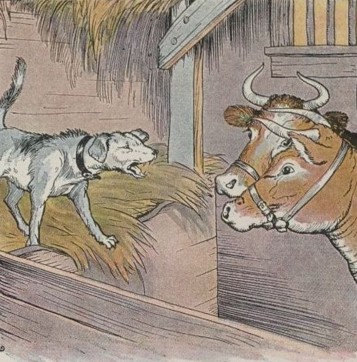PART A_1
Let’s learn vocabulary. Listen and repeat the words and the sentences with your tutor.
PART A_2
| 1. manger | /MEYN-jer/ |
| -an open box from which cattle and horses feed | |
| Having no choice, she opted to stay in the manger to be safe. | |
| 2. snarl | /snarl/ |
| -(especially of dogs) to make a deep, rough sound while showing the teeth | |
| The dog snarled when a thief was about to enter the premises. | |
| 3. snap | /snap/ |
| -to say something suddenly in an angry way | |
| She snapped when she heard the statement of her opponent. | |
| 4. seize | /siz/ |
| -to take hold of something quickly and firmly | |
| The police seized the item upon learning that it was illegal. | |
| 5. stable | /STEY-bl/ |
| -a building where horses are kept | |
| She hid in the stable in order to be safe. |
PART B_1
Let’s read the story. Please read it aloud, and I will check your pronunciation and intonation.
PART B_2
The Dog in the Manger

A Dog asleep in a manger filled with hay was awakened by the Cattle, which came in tired and hungry from working in the field. But the Dog would not let them get near the manger and snarled and snapped as if it were filled with the best of meat and bones, all for himself.
The Cattle looked at the Dog in disgust. “How selfish he is!” said one. “He cannot eat the hay and yet he will not let us eat it who are so hungry for it!”
Now the farmer came in. When he saw how the Dog was acting, he seized a stick and drove him out of the stable with many a blow for his selfish behavior.
Do not grudge others what you cannot enjoy yourself.
PART C_1
Let’s answer comprehension questions. Please answer them based on the story.
PART C_2
| 1. | What did the Dog do upon seeing the Cattle? |
| 2. | Why did the Dog react that way? |
| 3. | What did the farmer do to the Dog? |
PART D_1
Let’s discuss the story. Please answer the questions below and express your opinions.
PART D_2
| 1. | Was the Dog correct in reacting that way? Why or why not? |
| 2. | Is the Cattle correct in calling the Dog selfish? Why or why not? |
| 3. | Is the farmer correct with the punishment he gave to the Dog? Why or why not? |
| 4. | Do you agree with the moral of the story? Why or why not? |
| 5. | Why do you think some people tend to be selfish about the things they can’t enjoy themselves? |
REVIEW AND FEEDBACK
Now, let us review the things that you learned in this lesson.
ではこのレッスンで学んだことを振り返りましょう。
(Please give a short feedback on how your student did on your class.)
| Grammar 文法 |
Pronunciation 発音 | Vocabulary 単語 |
Comprehension 理解 |
|
|---|---|---|---|---|
 GOOD GOOD |
文法の誤りはほとんどなく、完全な文章で話すことができる | ほとんどの単語をはっきりと正しく発音することができる | 習った表現を適切に使うことができる | 文章を理解し、質問に正しく答えることができる |
 FAIR |
文法の誤りはあるが、完全な文章で話すことができる | 発音の練習が必要な言葉がいくつかある | たまにミスはあるが、習った表現を適切に使うことができる | 文章を完全に理解するのは難しく、質問に正しく答えられないときもある |
 POOR |
文章で話すのは難しく、単語だけで話すことができる | 発音の練習が必要である | 習った単語と表現を少しだけ使うことができる | 文章を理解するのは難しく、質問に答えるのは難しい |
Parts of this lesson material are based on:
An eBook from The Project Gutenberg.
This eBook is for the use of anyone anywhere at no cost and with almost no restrictions whatsoever. You may copy it, give it away or re-use it under the terms of the Project Gutenberg License included with this eBook or online at www.gutenberg.org
An eBook from The Project Gutenberg.
This eBook is for the use of anyone anywhere at no cost and with almost no restrictions whatsoever. You may copy it, give it away or re-use it under the terms of the Project Gutenberg License included with this eBook or online at www.gutenberg.org